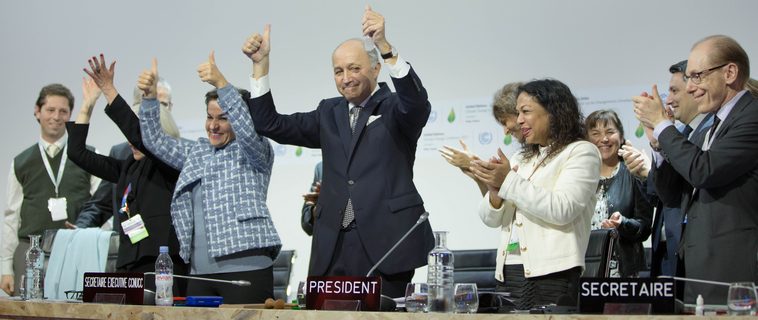By most measures, the Paris Agreement is a bad deal for African countries – signing on to bear the economic brunt of fixing a problem to which they have contributed very little. Yet, it could also prove to be a perfectly timed blessing in disguise for Africa’s energy future that would be a shame to see go to waste.

In 2015, the countries of the world unanimously adopted the Paris Agreement on Climate Change, which outlined efforts to limit average global temperatures to no more than 2° C above pre-industrial levels. This push comes as a result of the ever-growing scientific consensus on the existence of climate change, but also because of the increasing frequency of climate-driven disasters as well as encouraging estimates of the expected economic benefits from renewable energy.
Under the guiding principle of “common but differentiated responsibility”, all signatories are obliged to submit increasingly ambitious national plans every five years – including details about financing – to cut back on their individual total GHG emissions. Encouragingly, African countries have signaled an overwhelming desire to do their part: major economies such as Nigeria, South Africa, and Morocco have pledged to make drastic cutbacks to carbon emissions and commit considerable amounts of their energy demand to be met by a mix of renewable sources – 30%, 33%, and 52% respectively by 2030.
The boldness of these commitments signaled strong intent on the part of many African countries to take on the climate challenge in a direct and decisive way. It consequently awakened a largely untapped appetite for renewable energy in a continent gifted with an overabundance of renewable energy potential. With the majority of African countries still in the process of industrialisation and thus without long-established energy infrastructures, Paris provides an opportunity for Africa to establish itself as a leader and innovator in the clean energy revolution. If the countries of Africa can lean into this opportunity and capitalise on the recent promise shown by various methods of renewable energy generation, Africa can lead from the front on energy and help guide the world towards a more sustainable future.
It appears, however, that some of this initial momentum has not been sustained. The majority of countries – including African signatories – have fallen behind on their commitments, and a number of the world’s worst emitters are currently on track to average even higher emissions by 2030. Now more than ever it is essential that policymakers stay the course, even in the face of growing challenges.
Nigeria’s economic and social challenges are well-documented – there are currently many human development metrics for which it has a long way yet to go in addressing. High rates of extreme poverty, youth unemployment, and deaths from preventable diseases have culminated in a challenging few decades for many Africans. The Paris Agreement and its accompanying global fervor for clean energy is a chance to jump out ahead of the pack on this particular issue. With the emergence of both grid-based and smaller-scale decentralised solutions to energy access as well as an unprecedented public desire for large, sweeping climate action, African countries must renew their commitment to their lofty clean energy goals and continue to build on the excitement created by their initial enthusiasm.
In a time like this when the public health emergency created by the COVID-19 virus has disrupted economic activity across the world and jeopardised the livelihoods of millions, it is not particularly difficult to find reasons to prioritise other more pressing issues over honouring Paris commitments.
First, there is the concern that meeting the immediate energy needs of the almost 200 million people across Nigeria does not allow for a scaling back of current fossil fuel use. If we reduce fossil fuel use and invest instead in renewable energy generation, won’t millions of people be left with inadequate energy provision in the short-term? However, this is unfortunately already the case in many parts of the country and would not represent a departure from the current status quo.
The perceived high costs of renewable energy are also frequently highlighted as an obstacle to large-scale implementation but in actuality these claims are misleading, as the opposite is more often the truth. In fact, current record-low prices for oil could be an opportunity for governments to begin to phase out expensive oil subsidies that keep domestic oil prices artificially low and stifle growth in the renewable sector.
There are many reasons to feel aggrieved as a policymaker in Nigeria having to now also account for the additional costs of adhering to the Paris Agreement. With an unprecedented health emergency and the subsequent economic slowdown, the temptation to shift focus to other more urgent priorities is likely great. They would do well to resist this urge and instead continue to prioritise clean renewable investments and create an enabling environment for renewable efforts to grow. The world’s largest economies – and biggest polluters – also have a significant role to play.
The necessary investments will come at great financial costs to Nigeria and the advanced economies in Europe, North America, and now Asia will have to step in and lend assistance as promised under Paris. Changes of the scale suggested here are likely to come with significant challenges, but with the great sacrifice of Paris could come the beginning of a renewable energy transformation that guarantees that Nigeria finally takes on a leading role on the global stage.
By Tunde Olatunji (Studying Environmental Science and Policy at the Columbia University, New York)
